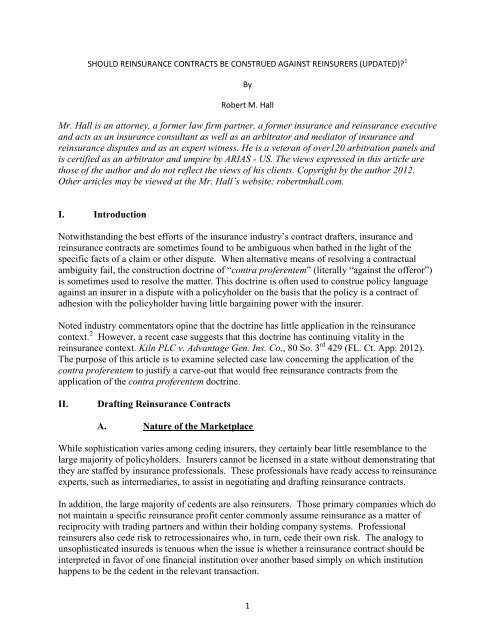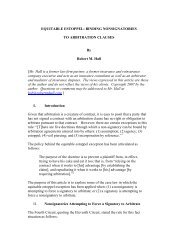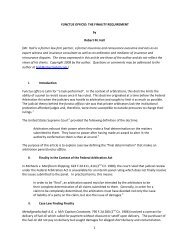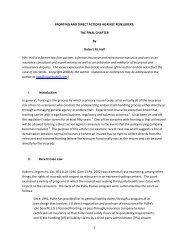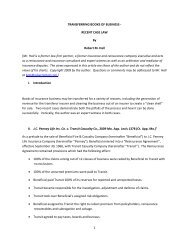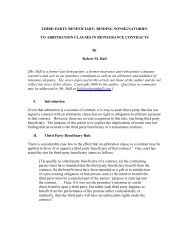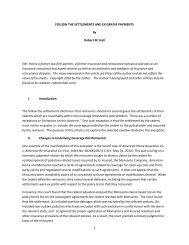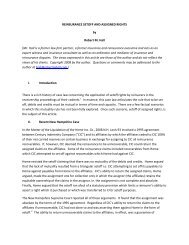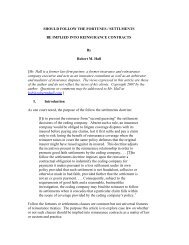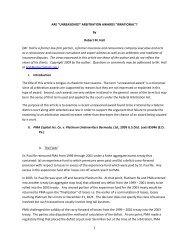Should Reinsurance Contracts be Construed ... - Robert M. Hall
Should Reinsurance Contracts be Construed ... - Robert M. Hall
Should Reinsurance Contracts be Construed ... - Robert M. Hall
Create successful ePaper yourself
Turn your PDF publications into a flip-book with our unique Google optimized e-Paper software.
SHOULD REINSURANCE CONTRACTS BE CONSTRUED AGAINST REINSURERS (UPDATED)? 1<br />
By<br />
Ro<strong>be</strong>rt M. <strong>Hall</strong><br />
Mr. <strong>Hall</strong> is an attorney, a former law firm partner, a former insurance and reinsurance executive<br />
and acts as an insurance consultant as well as an arbitrator and mediator of insurance and<br />
reinsurance disputes and as an expert witness. He is a veteran of over120 arbitration panels and<br />
is certified as an arbitrator and umpire by ARIAS - US. The views expressed in this article are<br />
those of the author and do not reflect the views of his clients. Copyright by the author 2012.<br />
Other articles may <strong>be</strong> viewed at the Mr. <strong>Hall</strong>’s website: ro<strong>be</strong>rtmhall.com.<br />
I. Introduction<br />
Notwithstanding the <strong>be</strong>st efforts of the insurance industry’s contract drafters, insurance and<br />
reinsurance contracts are sometimes found to <strong>be</strong> ambiguous when bathed in the light of the<br />
specific facts of a claim or other dispute. When alternative means of resolving a contractual<br />
ambiguity fail, the construction doctrine of “contra proferentem” (literally “against the offeror”)<br />
is sometimes used to resolve the matter. This doctrine is often used to construe policy language<br />
against an insurer in a dispute with a policyholder on the basis that the policy is a contract of<br />
adhesion with the policyholder having little bargaining power with the insurer.<br />
Noted industry commentators opine that the doctrine has little application in the reinsurance<br />
context. 2 However, a recent case suggests that this doctrine has continuing vitality in the<br />
reinsurance context. Kiln PLC v. Advantage Gen. Ins. Co., 80 So. 3 rd 429 (FL. Ct. App. 2012).<br />
The purpose of this article is to examine selected case law concerning the application of the<br />
contra proferentem to justify a carve-out that would free reinsurance contracts from the<br />
application of the contra proferentem doctrine.<br />
II.<br />
Drafting <strong>Reinsurance</strong> <strong>Contracts</strong><br />
A. Nature of the Marketplace<br />
While sophistication varies among ceding insurers, they certainly <strong>be</strong>ar little resemblance to the<br />
large majority of policyholders. Insurers cannot <strong>be</strong> licensed in a state without demonstrating that<br />
they are staffed by insurance professionals. These professionals have ready access to reinsurance<br />
experts, such as intermediaries, to assist in negotiating and drafting reinsurance contracts.<br />
In addition, the large majority of cedents are also reinsurers. Those primary companies which do<br />
not maintain a specific reinsurance profit center commonly assume reinsurance as a matter of<br />
reciprocity with trading partners and within their holding company systems. Professional<br />
reinsurers also cede risk to retrocessionaires who, in turn, cede their own risk. The analogy to<br />
unsophisticated insureds is tenuous when the issue is whether a reinsurance contract should <strong>be</strong><br />
interpreted in favor of one financial institution over another based simply on which institution<br />
happens to <strong>be</strong> the cedent in the relevant transaction.<br />
1
B. Clauses Required for Credit for <strong>Reinsurance</strong><br />
All states have laws and/or regulations that determine the circumstances under which a cedent<br />
may take financial statement credit for reinsurance. These laws have a considerable impact on<br />
the language of reinsurance contracts. For instance, they require, as a condition for credit for<br />
reinsurance, that reinsurance contracts contain provisions that:<br />
• Establish the criteria for an acceptable trust fund<br />
• Identify the contracts for which trust funds are established<br />
• Stipulate that certain types of assets are to <strong>be</strong> maintained in the trust fund<br />
• Require the cedent to take all steps necessary to liquidate the assets placed trust<br />
• Stipulate that assets in the trust may <strong>be</strong> withdrawn at any time by the cedent and used for<br />
specified purposes<br />
• Establish the criteria for an acceptable letter of credit<br />
• Identify the contracts for which a letter of credit is established<br />
• Allow a letter of credit to <strong>be</strong> withdrawn at any time by the cedent and <strong>be</strong> used for<br />
specified purposes<br />
• Require that the reinsurer <strong>be</strong> subject to service of suit in the US<br />
• In the event of insolvency of the cedent, require payment of reinsurance “without<br />
diminution” to the receiver of the cedent. 3<br />
While not technically a part of the credit for reinsurance laws and regulations, the Examiner’s<br />
Handbook of the National Association of Insurance Commissioners requires an “intermediary<br />
clause” which places credit risk on the reinsurer if the reinsurance intermediary converts<br />
premium or loss funds to the intermediary’s own use. Similarly, state regulators have declined to<br />
grant or renew licenses when they <strong>be</strong>lieved setoff clauses in reinsurance contracts were out of<br />
step with state receivership law or policy. 4<br />
Credit for reinsurance laws and regulations and the Examiners Handbook do not require specific<br />
language for the above clauses relying instead on a general description. However, standardized<br />
language has coalesced over time based, in part, on insurance regulators withholding credit for<br />
reinsurance due to language, which they <strong>be</strong>lieved, did not comply with relevant laws and<br />
regulations.<br />
Given that clauses required for credit for reinsurance are mandated by law, it is questionable<br />
whether they should <strong>be</strong> construed against reinsurers. Since the presence of these clauses works a<br />
substantial financial <strong>be</strong>nefit to the cedent, an opposite construction might <strong>be</strong> considered.<br />
C. Intermediaries<br />
Most reinsurance in the world is placed through reinsurance intermediaries. One of the functions<br />
of intermediaries is to negotiate and draft treaty language. While the intermediary clause places<br />
the credit risk of the intermediary on the reinsurer, the intermediary is the agent of the cedent for<br />
other purposes. 5 In this circumstance, it must <strong>be</strong> questioned whether a reinsurance contract<br />
should <strong>be</strong> construed against the reinsurer when it is drafted by the agent of the cedent.<br />
2
D. Treaty <strong>Reinsurance</strong><br />
<strong>Reinsurance</strong> treaties, which cover many risks of a predetermined nature, are often negotiated by<br />
the parties over months, if not years. There is often considerable give and take <strong>be</strong>tween the<br />
cedent and reinsurer as to its final form. Cedents sometimes present the reinsurer with desired<br />
clauses and, in some cases, an entire reinsurance contract as an example. As a result, the final<br />
product may <strong>be</strong> a blend or compromise of language desired by the cedent and reinsurer making<br />
problematical attribution of authorship of the contract or particular clauses thereof.<br />
E. Facultative <strong>Reinsurance</strong><br />
Facultative reinsurance, traditionally written on individual risks, is considerably different from<br />
treaty reinsurance. Facultative reinsurance is much more immediate in that it focuses on a<br />
specific risk presented for coverage in the near future rather than large blocks of business which<br />
turn over annually at a predetermined time. As a result, there are seldom months of time to craft<br />
a facultative reinsurance agreement.<br />
For these reasons, facultative reinsurance is usually written on a “facultative certificate” which<br />
contains the variable information concerning the risk on the front and the contractual language<br />
on the back. Given the effort to limit the contract language to one page, extensive elaboration is<br />
not possible. However, this is counterbalanced by the fact that a specific risk with specific<br />
characteristics is <strong>be</strong>ing reinsured rather than a general class of unknown risks, as is the case with<br />
treaty reinsurance.<br />
The contractual language on the certificate is standardized on a reinsurer-by-reinsurer<br />
basis. While cedents and reinsurers sometimes negotiate side agreements dealing with difficult<br />
issues (e.g. declaratory judgment expenses), this is not generally the case. As a result, facultative<br />
certificate language commonly receives less input from cedents than does treaty<br />
language. Nonetheless, cedents are free to negotiate the terms of facultative certificates, and<br />
have considerable leverage to do so, or to direct their business to other reinsurers offering more<br />
favorable terms.<br />
III.<br />
Impact of Case Law<br />
A. Cases Finding a Presumption Against Reinsurers<br />
The rule in the Seventh Circuit is that ambiguous reinsurance contracts are construed against<br />
reinsurers. Zenith Insurance Co. v. Employers Insurance of Wausau, 141 F.3d 300 (7 th Cir.<br />
1998) dealt with the interpretation of a prompt notice requirement in a facultative certificate<br />
under Wisconsin law. Construing the clause against the reinsurer the court stated:<br />
In cases dealing with primary insurance contracts and insured parties,<br />
Wisconsin follows the common rule that ambiguities in the contract are to <strong>be</strong><br />
construed in favor of the insured party. [citations omitted] (noting that<br />
3
Wisconsin’s rule for construing ambiguities against the drafter “has<br />
particular force . . . where there is a substantial disparity of bargaining power<br />
<strong>be</strong>tween the parties.”)<br />
. . . Almost fifty years ago, this court, contrary to the view adopted by the<br />
Second Circuit in Unigard, concluded that under Wisconsin law the court<br />
must construe ambiguities in reinsurance contracts in favor of the<br />
reinsured. Employers Mutual Liability Ins. Co. v. Underwriters at Lloyd’s,<br />
117 F.2d 249, 252 (7 th Cir.1949) aff’g 80 F.Supp. 353, 355<br />
(W.D.Wis.1948). We can find nothing in Wisconsin law that indicates<br />
Wisconsin courts <strong>be</strong>lieve that we had misstated the law in Employers<br />
Mutual. . . From a policy standpoint, some of the interests protected by the<br />
general rule that insurers <strong>be</strong>ar the brunt of contractual ambiguities are just as<br />
applicable to reinsurance cases, and others are not. For example, one<br />
important reason why Wisconsin courts construe insurance contracts in favor<br />
of the insured party relates to that party’s reasonable reliance interests. That<br />
interest is similar whether one is speaking of a primary policy and the<br />
<strong>be</strong>neficiary or a reinsurance policy and a primary reinsurer. . . We would<br />
need more recent evidence from Wisconsin contradicting Employers Mutual<br />
to justify a carve-out that would free reinsurance policies from Wisconsin’s<br />
general rules of interpretation for insurance policies. 6<br />
In essence, the court followed the Employers Mutual in the absence of any Wisconsin case law to<br />
the contrary. However, the case followed does not appear to turn on the contra proferentem<br />
concept.<br />
Employers Mutual Liability Ins. Co. v. Underwriters at Lloyd’s, 117 F2d 249 (7 th Cir. 1949)<br />
involved a product liability claim which was paid by the cedent and for which the cedent sought<br />
reimbursement from its reinsurer. The reinsurer claimed that the loss did not fall within the<br />
product liability coverage of the policy and should not have <strong>be</strong>en paid. This decision presents<br />
what the industry now regards as a classic follow the settlements issue: Can the reinsurer secondguess<br />
the cedent’s reasonable coverage decisions? While the court was not conversant with<br />
industry phraseology, it clearly recognized the issue: “In other words, Lloyd’s by their<br />
reinsurance contract stepped into the shoes of Employers Mutual to the extent of the latter’s<br />
liability to the insured.” Id. at 252. In it’s holding, the court declined to apply the contra<br />
proferentem rule:<br />
We think the rule of construction must <strong>be</strong> invoked against Lloyd’s not <strong>be</strong>cause<br />
they issued the reinsurance contract but for reason that they assumed the liability<br />
of Employers Mutual, which liability encompasses, if necessary, the resolution of<br />
doubt against it. Id.<br />
Stated differently, the court ruled against the reinsurer, not <strong>be</strong>cause it issued the reinsurance<br />
contract but <strong>be</strong>cause it assumed the risk of close coverage calls by the cedent i.e. follow the<br />
settlements.<br />
4
Nonetheless, Employers Insurance was followed in National Union Fire Ins. Co. v. American<br />
Re-Insurance Co., 2005 U.S. Dist. Lexis (S.D.NY. 2005). The posture of this case was a motion<br />
for reconsideration by the reinsurer with respect to interpretation of pollution exclusion under<br />
Ohio law. The court denied the motion stating:<br />
Hence, Employers Insurance stands for at least two points: (1) the Ohio courts<br />
have declined to follow New York law, and (2) under general contract principles,<br />
even reinsurance contracts are to <strong>be</strong> construed against the drafter.<br />
Here, <strong>be</strong>cause Ohio law rather than New York law applies, and <strong>be</strong>cause it is<br />
undisputed in any event that American Re drafted the pollution exclusion clause,<br />
the motion for reconsideration and reargument must <strong>be</strong> denied. Id. at *10.<br />
Employers Mutual was cited favorably in a footnote in Fontenot v. Marquette Casualty Co., 247<br />
So.2d 572, 580 (La.1971) which involved a direct action by a claimant against the reinsurer of an<br />
insolvent reinsurer. Despite the favorable citation, the court rejected the notion that any<br />
ambiguity in the reinsurance contract authorized a recovery from one not in privity with the<br />
reinsurer. As a result, contra proferentem was not the basis of the court’s holding.<br />
The contra proferentem concept was cited in Mountain States Mutual Casualty Co. v. Peerless<br />
Casualty Co., 160 F.Supp. 303 (D.Mon 1958), which was a suit for reformation or interpretation<br />
of an amendment to the reinsurance contract brought by the cedent. The court granted the<br />
interpretation desired by the cedent but cited a num<strong>be</strong>r of factors for its conclusion including its<br />
own interpretation of the amendment in question, the correspondence <strong>be</strong>tween the parties, the<br />
good faith obligation <strong>be</strong>tween cedent and reinsurer, the obligation of the reinsurer to follow the<br />
settlements of the cedent and the rule “that contracts of reinsurance should <strong>be</strong> li<strong>be</strong>rally construed<br />
in favor of the reinsured.” Id. at 307. As a result, it is difficult to determine what factor the<br />
concept of contra proferentem had in the court’s decision.<br />
The contra proferentem concept also appeared in Justice v. Stuyvesant Ins. Co., 265 F.Supp. 63<br />
(S.D. W.Va. 1967), which involved a dispute over a minimum annual premium. The court<br />
observed, in dicta, that ambiguities in the reinsurance contract should <strong>be</strong> interpreted against the<br />
reinsurer, citing to a 1946 edition of C.J.S. Insurance, <strong>be</strong>fore interpreting the contract in favor of<br />
the reinsurer.<br />
In Transit Casualty Company in Receivership v. Certain Underwriters At Lloyd’s, 963 S.W.2d<br />
392 (Mo.Ct.App. 1998), the receiver of Transit sued the reinsurers who petitioned the court to<br />
compel arbitration. The case turned on a perceived conflict <strong>be</strong>tween the arbitration and service<br />
of suit clauses. 7 The court initially observed that ambiguities in reinsurance contracts would <strong>be</strong><br />
construed against the party who drafted the contract, citing as support a case that did not involve<br />
reinsurance. 8 The court stated that the reinsurers admitted to drafting the service of suit clause<br />
and then proceeded to construe it against them on the basis that they could have drafted it in a<br />
fashion, which would have had the desired interaction with the arbitration clause. The court<br />
failed to consider (see Section II B, supra) that the service of suit clause is a standardized<br />
provision based on credit for reinsurance law and one which the cedent would have surely have<br />
demanded for financial statement purposes if the reinsurer had not included it in the contract.<br />
5
In addition, there is the recent case of Kiln PLC v. Advantage General Insurance Co. Ltd., 80<br />
So.3d 429 (Ct.App.FL 2012) which involved reinsurance of an aircraft liability policy and<br />
whether such reinsurance covered injuries to aircraft passengers rather than employees of the<br />
airline. The cedent sought reinsurance from Lloyd’s of London and at the time, such reinsurance<br />
could <strong>be</strong> obtained only through a Lloyd’s broker. The reinsurer provided the language of the<br />
reinsurance coverage to the Lloyd’s broker who, allegedly, understood it was not intended to<br />
cover passengers. However, the language was unclear on point. The trial court granted<br />
summary judgment on the coverage issue in favor of the cedent. The appellate court cited the<br />
contra preferentem doctrine in reversing and remanding the case for more examination of<br />
extrinsic evidence, including the issue of whether the Lloyd’s broker was the agent of the<br />
reinsurer or cedent.<br />
IV.<br />
Case Law Finding No Presumption Against Either Party<br />
The Second Circuit is the leading source of authority for the proposition that contra proferentem<br />
should not <strong>be</strong> applied to reinsurance contracts. The earliest case on point is Great American Ins.<br />
Co. v. Fireman’s Fund Ins. Co., 481 F.2d 948 (2 nd Cir. 1973) which involved a dispute over a<br />
cancellation notice. The court stated: “Although ordinarily we would <strong>be</strong> disposed to interpret the<br />
language of an ambiguous notice in favor of the insured and against the insurer, we consider that<br />
this general rule should not apply when both the insured and insurer are ‘large insurance<br />
companies long engaged in far flung activities in that field of economic endeavor.’” 9<br />
The next Second Circuit case in the series is United States Fire Ins. Co. v. General <strong>Reinsurance</strong><br />
Corp., 949 F.2d 569 (2 nd Cir. 1991). This was a suit <strong>be</strong>tween two excess insurers to allocate a<br />
loss <strong>be</strong>tween them. The court stated:<br />
Presently, “contra preferentem [sic] is used only as a matter of last resort<br />
after all aids to construction have <strong>be</strong>en employed and have failed to resolve<br />
the ambiguities in the written instrument.” [citations omitted] The New York<br />
courts have specifically stated that the rule “is not applicable in a contest<br />
<strong>be</strong>tween two insurance companies.” [citations omitted]<br />
. . . Where the dispute is <strong>be</strong>tween two insurance companies, both parties are<br />
sophisticated business entities, familiar with the market in which they deal<br />
and armed with relatively equivalent bargaining power; hence the contra<br />
insurer rule serves little purpose. Id. at 573-4.<br />
The third Second Circuit case is Unigard Security Ins. Co. v. North River Ins. Co., 4 F.3d 1049<br />
(2 nd Cir. 1993) in which the reinsurer asserted a late notice defense. A certain question was<br />
certified to the New York Court of Appeals. With respect to the contra proferentem doctrine, the<br />
Second Circuit stated:<br />
(W)e <strong>be</strong>lieve that this canon of construction does not apply in this matter. In<br />
answering the certified question, the New York Court of Appeals used an<br />
analysis based on “general contract principle[s]” [citation omitted] and made<br />
no reference whatsoever to such a canon of construction. We <strong>be</strong>lieve that the<br />
6
Court of Appeals was implicitly recognizing that reinsurance contracts are<br />
negotiated at arm’s length by two sophisticated parties [citation omitted] and<br />
that canons of construction that protect individual purchasers of original<br />
insurance policies do not apply to reinsurance. [citation omitted] . . . Indeed,<br />
reinsurers are so dependent upon ceding insurers for information, that<br />
application of a canon construing the reinsurance contract against the<br />
reinsurer would <strong>be</strong> highly anomalous. Id. at 1065.<br />
In the fourth Second Circuit case, British International Ins.Co. v. Seguros La<br />
Republica, 342 F.3d 78 (2 nd Cir. 2003), the court declined to apply the contra<br />
proferentem doctrine in a dispute over coverage for declaratory judgment expenses:<br />
“New York law enforces reinsurance contracts without resort to the contra<br />
proferentem rule that is sometimes used in the context of direct insurance.” Id. at *8.<br />
In Professional Consultants Ins. Co. v. Employers <strong>Reinsurance</strong> Co., 2006 U.S. Dist.<br />
Lexis 24170 (D.Vt. 2006) the court followed the Second Circuit cases with respect to a<br />
dispute over limits in a treaty stating:<br />
There is a stronger case, however, for not applying [contra proferentem<br />
doctrine] and treating the agreement like any other contract <strong>be</strong>cause a key<br />
policy rationale for the [doctrine] – unequal bargaining power – is absent<br />
where the reinsured is a sophisticated party and who bargained for he<br />
contract language. Id. at 12.<br />
Massachusetts has rejected the contra proferentem concept for reinsurance contracts. Boston Ins.<br />
Co. v. Fawcett, 258 N.E.2d 771 (Mass.1970) was a dispute over the application of a<br />
retention. The court stated:<br />
We note also that all the parties to the litigation are large insurance companies<br />
long engaged in far-flung activities in that field of economic activity. We are<br />
accordingly not disposed to invoke the rule based on a presumed disparity of<br />
experience or acumen that “ambiguities in the policy are to <strong>be</strong> construed against<br />
the insurer.” [citation omitted] Rather, we impute to all parties the ability to use<br />
appropriate language to make clear the risks against which the reinsurance is<br />
issued. Id. at 775.<br />
This position was confirmed more recently by the Supreme Judicial Court in Affiliated FM Ins.<br />
Co. v. Constitution <strong>Reinsurance</strong> Corp., 626 N.E.2d 878 (Mass. 1994) which focused on<br />
declaratory judgment expenses under a facultative certificate. The court stated:<br />
Affiliated contends that, if there is doubt concerning the scope of expenses, the<br />
doubt should <strong>be</strong> resolved against Constitution, the drafter of the<br />
certificate. Although there is a rule of construction that certain writings are to <strong>be</strong><br />
construed against the author of the doubtful language, [citation omitted] that rule<br />
must give way to the primary objection that a contract is to <strong>be</strong> construed to reflect<br />
7
the intention of the parties. Id. at 881.<br />
Similarly, the federal district court for Massachusetts did not apply the contra proferentem<br />
doctrine against a reinsurer with respect to a facultative certificate in Commercial Union Ins. Co.<br />
v. Seven Provinces, Inc., 9 F.Supp.2 nd 49 (D.Mass. 1988). “Although the first page of the<br />
certificate <strong>be</strong>ars the name of Seven Provinces, both parties acknowledged that the certificate was<br />
made up of a series of standardized forms routinely used by Sayre & Toso, who was at the time<br />
the agent of each.” Id. at 54.<br />
V. Conclusion<br />
The contra proferentem doctrine is a rule of construction of contracts that interprets ambiguous<br />
contracts against the drafter. It is based, largely, on a supposition of very unequal bargaining<br />
power that justifies that approach.<br />
While this doctrine has some justification in primary insurance, it does not support construing<br />
reinsurance contracts against reinsurers. Some terms in reinsurance contracts are mandated by<br />
regulation, primarily for the <strong>be</strong>nefit of cedents. <strong>Reinsurance</strong> intermediaries, who are the agents<br />
of cedents for most purposes, draft most reinsurance contacts. Insurers and reinsurers are large<br />
financial institutions, fully capable of protecting their contractual interests through lawyers and<br />
contract specialists. There can <strong>be</strong>, and often is, substantial give and take <strong>be</strong>tween insurers and<br />
reinsurers over contract language.<br />
Some courts have retained a stare decisis approach to construction of reinsurance contracts based<br />
on assumptions that do not fit the modern reinsurance model, as descri<strong>be</strong>d above. Other courts,<br />
such as those in the Second Circuit, have recognized the realities of reinsurance relationships and<br />
have long since discarded contra proferentem as a rule of construction for reinsurance contracts.<br />
ENDNOTES<br />
1<br />
This is an update of an article originally published in 2000.<br />
2<br />
John Nonna and Marc Abrams, Custom and Usage Evidence Regarding Insurance <strong>Contracts</strong>,<br />
www.law.con/jsp/cc/PubArticleCC.jsp?id=900005444078(2005); Eugene Wollan, Handbook of<br />
<strong>Reinsurance</strong> Law, Aspen Publishing §2.01[D] (2003).<br />
3<br />
See e.g Ill. Admin. Code §1104.10 et seq.<br />
4<br />
A num<strong>be</strong>r of years ago, the insurance department of California had what is locally dub<strong>be</strong>d<br />
an “underground rule” concerning setoff clauses. The department declined to grant licenses to<br />
companies that had reinsurance contracts with setoff clauses that had <strong>be</strong>en found by the<br />
California Supreme Court to <strong>be</strong> consistent with receivership law. Prudential <strong>Reinsurance</strong> Co. v.<br />
Superior Court, 842 P.2d 48 (Cal.1992). This practice ceased only after suit was filed by the<br />
<strong>Reinsurance</strong> Association of America.<br />
8
5<br />
In the Matter of Pritchard & Baird, Inc., 8 B.R. 265, 269-70 (D.N.Y. 1980).<br />
6<br />
141 F.3d 300, 304-5 (7 th Cir. 1998).<br />
7<br />
For more case law on this topic see Ro<strong>be</strong>rt M. <strong>Hall</strong>, Does a Service of Suit Clause in a<br />
<strong>Reinsurance</strong> Contract Bar Removal of a Dispute to Federal Court? <strong>Reinsurance</strong> Vol. 2 No. 8 at 4<br />
(2010). It is also available at the author’s website: ro<strong>be</strong>rtmhall.com<br />
8<br />
Id. at 397. The cited case was Graue v. Missouri Property Ins. Placement Facility, 847 S.W.2d<br />
779 (Mo. 1993) and involved the apparent authority of an insurance agent with respect to a<br />
premium notice issued by a primary company.<br />
9<br />
Id. at 954. The court was quoting language from Boston Ins. Co. v. Fawcett, 258 N.E.2d 771<br />
(Mass.1970)<br />
9


